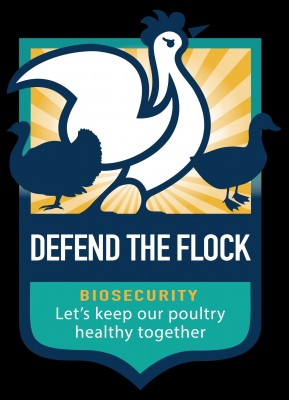Follow Best Practices to Prevent the Spread of Bird Flu
Amy Barkley, Team Leader & Livestock Specialist
Southwest New York Dairy, Livestock and Field Crops Program

Follow Best Practices to Prevent the Spread of Bird Flu
Nancy Glazier and Amy Barkley, Regional Livestock Specialists, Cornell Cooperative Extension
We are now one year into the avian influenza outbreak, and field season is just around the corner. With this comes a higher potential exposure to and spread of this virus from wild birds to domestic birds as well as between domestic flocks. It's not time to let our guard down, as we anticipate similar rates of infection to what we saw in 2022. Please take precautions when visiting fields with migratory birds and farmsteads.
Highly Pathogenic Avian Influenza (HPAI) continues to be a threat, and is the largest domestic animal disease outbreak recorded in U.S. history. In New York, we have seen 13 cases in domestic flocks and hundreds of cases in wild birds to date, with the most recent domestic flock case having been identified in mid-February. This strain can infect chickens, turkeys, game birds, waterfowl, ratites (emus, etc.), and a wide variety of wild birds including waterfowl, raptors, and corvids. It can spread from bird to bird by direct contact as well as through farm equipment, clothing, and shoes.
Birds affected with HPAI may show one or more of the following clinical signs: sudden death without clinical signs; lack of energy and appetite; decreased egg production; soft-shelled or misshapen eggs; swelling of the head, eyelids, comb, wattles, and hocks; purple discoloration of the wattles, combs, and legs; nasal discharge; coughing, sneezing; lack of coordination; and diarrhea. The Highly Pathogenic strain can spread and kill an entire flock within days, backyard flocks included. Many, if not all of the birds in a flock will be affected.
Precautions are needed to prevent further spread. This virus is not known to be a public health concern.
If you are visiting a poultry farm, follow these procedures:
- Do not enter any farm premise without permission from the owner.
- Whenever possible, make an appointment prior to traveling to the farm.
- Wear clean clothes and shoes on the day of the visit and clean and sanitize footwear in-between farm visits.
- When you arrive, park your vehicle at the end of the farm drive or on the roadside and use your cell phone to notify the owners of your presence and to receive instructions for entry. Or, set up an appointment ahead of time
- Let the farm owner know if in the previous five days you have been on another poultry farm or if you've had contact with wild birds. Also let them know if you personally own or care for birds or poultry.
- Observe all of the farm's instructions regarding biosecurity procedures.
- Do not enter animal housing areas without express permission from farm owner.
- Do not touch animals unless that is part of your tasks on the farm.
- Immediately report anything unusual to farm owner, especially sick or dead birds.
New York and many other states have enacted emergency regulations that restrict interstate transport of poultry and add new, more stringent requirements for entry. If you are planning to move poultry across state lines, be sure to check with the state veterinarian's office in the receiving state to be sure you're meeting all the requirements.
If you have death loss in your home flock or a flock you manage, call NYS Department of Agriculture and Markets at 518-457-3502. This number is available 24 hours a day. If after normal business hours, select State Watch Center option. More information can be found on the website, https://agriculture.ny.gov/animals/poultry or by calling your local Cornell Cooperative Extension office. Your attention to these precautions is critical to protecting bird health and our state's farm economy!
The New York Extension Disaster Education Network (NY EDEN) is a collaborative educational network based at Cornell University and dedicated to educating New York residents about preventing, preparing for, and recovering from emergencies and disasters. NY EDEN is working with the New York State Department of Agriculture and Markets to provide resources and updates to poultry producers.
Upcoming Events
Piglet Health 101
February 13, 2026 : Piglet Health 101 - Batavia, NY
Batavia, NY
This free workshop from the New York Pork Producers offers hands-on training in essential piglet care and processing practices, led by industry veterinarians from Passion for Pigs. No matter your experience level, this training offers takeaways for both new and experienced producers.
Boots in the Barn: Cornell Dairy Research Updates
January 13, 2026
January 20, 2026
January 27, 2026
February 3, 2026
February 10, 2026
February 17, 2026
February 24, 2026
Join us for some or all!
2026 No-Till & Cover Crop Conference
February 19, 2026 : 2026 No-Till & Cover Crop Conference
South Burlington, VT
Announcements
Cows, Crops & Critters Newsletter Sponsorship
TRYING TO REACH GROWERS AND AGRIBUSINESSES IN OUR SOUTHWEST REGION OF NEW YORK?Weekly Email Update: Shared with 625+ households who have signed up with our program.
Monthly Paper Mailer: To reach our stakeholders and farmers who lack internet access, we send out a monthly mailer where your company's logo and contact information would be featured with a mailing list of 330+ households.
If you sponsor our weekly and monthly publications you reach approximately 955 households.





